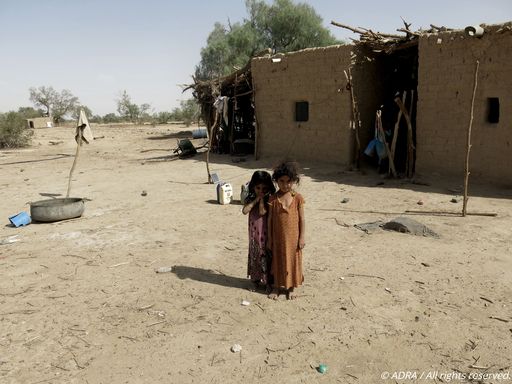Hello and welcome to the MOAS podcast.
In this edition of our podcast, we are exploring the subject of the situation in Yemen by discussing the consequences of the protracted conflict in the country on its society and on its people, as well as highlighting the urgent humanitarian needs of the Yemeni population and their efforts to rebuild their country and overcome the challenges they are facing. To do this, we interviewed Laura Silvia Battaglia al-Jalal, a journalist living between Italy and Sanaa (Yemen). She has worked in Middle Eastern conflict zones since 2007 and has reported from hostile environments about criminality, human rights issues, trafficking, terrorism and the arms trade.
We asked her some questions about the issue, starting from her connection with Yemen to the challenges and prospects of the country.
Listen to the podcast here:
Firstly, can you please tell us about your connection or link with Yemen? How long have you been focusing on the country?
Laura Silvia Battaglia: I moved to Yemen in 2012 after following the Arab Revolutions, the so-called Arab Spring, in 2011. The first place I went was not a professional choice because I was looking for a place where I could study Arabic and stay and focus on the language. After a few months in 2012, I started working there as journalist, trying to understand the culture and the place where I was living. It is a magnificent and beautiful country with a lot of lovely people.
I did a lot of work and studying there, and I really enjoyed this kind of not stressful life, a very simple life that goes with the sun and the moon, with no electricity at all at night and something completely different to the life I lived in Europe and I enjoyed that very much. Despite all the difficulties and problems you can face as a woman that lives there alone, but I can say that I never felt danger and I always found the people around me to be very good with me and very human. My ties with Yemen became deeper when I also established a family there. Basically, Yemen is my now second home and of course, as you can imagine, when the war started, it was very painful because I was still there and I realised that I had to leave the country. It was very painful going back to Yemen three times during the conflict and realising that the war really changes everything.
You have been present in Yemen both before and during the war – Can you give us an insight on the effects of the conflict on the country, on its essential services and on the people, from your experience?
LSB: The effects of the conflict in the country are really strong, and speaking in terms of numbers we can say that, of a population of nearly 29 million, the war has caused 10,000 deaths, more than 53,000 people to be wounded and more than 2 million displaced, without out mentioning the fact that 17 million people are short of food and over 8 million are at risk of starvation. This is just in numbers, but it is very difficult to find another humanitarian crisis nowadays like the Yemen humanitarian crisis. There are many reasons why this is happening. First of all, the fact that the country was poor before the revolution and before the war. The effects on the people are, like in every war, absolutely painful. We have civilians who try to still be in the middle and not participate in fights and battles and they are trapped in this situation and most of the time they became displaced, especially people who are refugees, for example, from Somalia or Ethiopia and there are many in Yemen.
Plus, the fact that the society became a battle ground for many militias, became more politicised and everything including religion was politicised by all the sides. The country is divided into two countries, with two so-called governments. People that have part of their family in the south and another part of their family in the north, they are absolutely separated by this situation and they struggle a lot. We can say that Yemenis feel absolutely forgotten by the international community. They feel attacked, the people in the north by the Saudis. People in the south feel that the people in the north are betraying them and vice versa. It’s a kind of battleground everywhere starting from the families. It’s something we never saw before, so the situation is absolutely difficult and all Yemenis are looking forward to the end.
Let’s explore the combination of war and Covid-19 in a country such as Yemen: what have been the new challenges that the country and people have faced and what are the possible developments of the situation this year?
LSB: When COVID-19 started spreading all over the world, especially in Europe, Yemenis at the beginning didn’t realise that COVID-19 could come to Yemen. First because Yemen is isolated, so they thought COVID-19 will never come to us, also some preachers started saying that this coronavirus is an illness of infidels, that comes to countries that don’t believe in God like China and doesn’t come to Yemen because it is a source of Islam. They also started saying that it is a curse for Europeans because their societies are secularised and there’s no good health care etcetera. Of course, we are talking about extremists.
What happened was at the beginning, the authorities blamed foreigners, they started saying that the first case in the south was a guy working on an Emirates ship and another one, the government in the north said the first COVID-19 patient was Somali refugee. So, they started saying that the responsibility came from foreigners and migrants. The first responsibility is given to foreigners – but that is the story of the whole pandemic, it’s something we see all over, in Europe or in the US.
After the first steps of COVID-19, people started getting scared because it spread a lot immediately and many young men around 30 years old died. COVID-19, basically, is not a big issue in the end in Yemen. If we think about cholera and other kind of illnesses and they are stronger than COVID-19. Actually, what happened was a lot of doctors at the beginning, they did not want to go into the hospitals because they felt completely abandoned, they didn’t have any tools to face COVID-19 and then after a couple of months, some supplies arrived especially in the south. It’s still a problem in Yemen but we don’t have the real number of infections and patients, and the real number of people that have died of COVID-19.
As we know, malnutrition is one of the worst consequences of the war and a devastating plight for Yemen: can you tell us more about this dramatic issue that affects a substantial amount of the Yemeni population and in what ways, who’s more affected and why?
LSB: Malnutrition is one of the worst consequences of the war but it’s something that Yemen knew before. This is important to say, especially in the governorates in the north like Hajjah between Sanaa and Saada. There are so many villages where people are displaced there, they don’t have normal access to food. Some of them don’t have cars, they can’t refuel their car to go to the closest bigger village. What also happens is that women give birth to children who are malnourished because during the pregnancy they don’t eat and there is a cultural issue with women in this area as they serve the lunch and the dinner first to the male, then to the children, then they eat, even though they are pregnant. This is important to address because everyone thinks that malnutrition is one hundred percent a consequence of the war which it is not. But of course, the war made things worse and worse.
Malnutrition is absolutely a painful consequence of the war. Honestly, I can say that I am a witness of the death of a child in front of me in a hospital in Yemen in 2016, and the child was three years old but looked like a child of three months and he died despite all the help the nurses and the doctors tried to give him. For me, it was absolutely unbelievable thinking that someone can die from hunger in 2016 while all our supermarkets have plenty of food. It’s a shame honestly, it’s a shame.
To conclude on a more hopeful note: what about local Yemeni communities? What is their potential and what are they doing in particular to overcome the difficulties they are facing? Things that are perhaps not often reported on in the usual news cycle.
LSB: Despite the war, Yemeni people are trying to struggle and find a way out of this war in their own way. What is interesting to say is that Yemenis are not waiting for international help, they think that they are forgotten, and they are trying internal ways, apart from the politics. I’m talking about daily life and finding a way out. In the last years, we saw some reports about malnutrition and the war but very very few stories about the resilience of Yemeni people. There are so many, there are young activists, male and female, and they are doing what they can, trying to open radio stations, establish activities, doing exhibitions of paintings, this is more in the south of the country, making movies. There are some musicians of the last orchestra of Yemen that despite the presence of militias they try to have music in Sanaa, even though they know that music is not liked by militias. So, they are risking their lives.
There are some journalists, for example, in the south that are trying to collect the stories of people that are kidnapped in the night by masked men and the families have to pay to have their relatives released. And this is a very similar story to what happened in Iraq in Baghdad in 2006 and gives us the perception that justice doesn’t have a place in Yemen, and this is very important to say because when the war ends, all the social environment should be reconstructed, starting from the people, even though they are not part of parties or they don’t have any power in this sense. They are trying to build another Yemen.
Final thoughts
We are very grateful to Laura for her fantastic insights on the challenging situation in Yemen and the prospects of the Yemeni people, and providing an alternative view to a lot of what is seen in the media. The humanitarian situation in Yemen continues to be a major priority to MOAS’ operations. Through collaboration with our partners, MOAS is working hard to alleviate the suffering of the population in Yemen, through our shipments of nutritional supplements and medical supplies to the country.
If you are interested in the work of MOAS and our partners, please follow us on social media, sign up to our newsletter and share our content. You can also reach out to us any time via [email protected]. If you want to support our operations, please give what you can at www.moas.eu/donate/.



